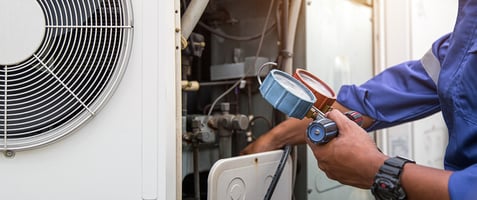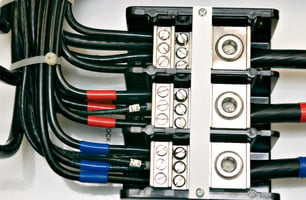Have you ever found that when you turn on a window air conditioner to cool a stuffy or too-hot...
Air Conditioning Options and Electrical Requirements
You might think it’s kind of odd that we dedicate this post to air conditioning when that’s not our gig. (You need an HVAC pro for that!) But we know you either have or want to air-condition on those hot DC summer days, and there are some electrical issues to consider. So we’ll look at central air conditioning, window air conditioning, and mini-splits so you can decide what is most suitable for your home and budget.
Central Air Conditioning- the Great Equalizer
When all else is equal, it’s tough to beat central air. These systems use ductwork and an outdoor cooling system to provide cool, refreshing air throughout your home. It is a wonderful convenience, and many people consider it a necessity.
You’ll need a hard-wired, dedicated circuit for central air conditioning with 220-volt or 240-volt capacity. Central air systems may require as much as 5,000 watts of electricity to start up, making them one of the largest electric power consumers in your home. These AC units require anywhere from 15-60 amps depending on the size of the unit.
Central air conditioning will cost you, but many homeowners - especially in areas like Washington DC with high heat and humidity - believe that it is a worthwhile investment. Some energy-efficient models and brands may save you money, so shop around. You can expect to spend upwards of $5000 on a new central air conditioning unit installed in your home. In addition, if you need more than one cooling zone, the cost will increase accordingly.
Window Air Conditioning Lets You Sleep on It
Window air conditioners might be the more economical option for some homeowners and most renters. These units are clearly more affordable upfront, but they tend to use a LOT of energy to cool a single room in your house. And they work even harder if you’re trying to cool a large area.
The most significant advantage of the window air conditioner is the purchase price. It is, without doubt, the least expensive thing as far as the initial outlay of money. With the help of YouTube, most people can install them without needing to call a professional.
Most room air conditioners operate on 110, 115, or 125-volt circuits and can be plugged into a standard circuit as long as it is not shared with another major appliance. These units will have cooling capabilities below 15,000 BTUs.
Window units larger than 7.5 amps or 220-volts need a dedicated circuit. In addition, these larger units will have a cooling capacity above 15,000 BTUs.
If you can budget the upfront costs for a different solution (central or mini-split), you’ll enjoy savings in the monthly energy usage, and you will likely appreciate the quiet, too. Window air conditioners are not known for their whisper-soft sounds. They also tend to block the view out the window, which might be a downside. Expect to pay a few hundred dollars or more for a quality window air conditioner, but you can find prices all over the scale, including second-hand window air conditioners.
Split the Difference with a Mini-Split
The mini-split is an air-conditioning dream if you can fit it into your budget. These units don’t need ductwork to operate (like central air) but use smaller units in strategic areas. They are connected to an outdoor condensing unit and come in through walls, not ductwork. A small box is installed on the wall, not in the window.
Mini-splits have particular power requirements that are dependent on the model and size. Generally, most systems need dedicated circuits of 220 volts or higher, but a few of the 9k to 12k systems may only need a 110-volt service. In addition, the capacity of the electrical panel needs to be sufficient.
If you are not using a forced-air system to heat your home, a mini-split is ideal. Most split air conditioners have a heat pump and a cooling element, so the same system keeps you warm in the winter.
Make Sure Your Home Is Ready for an Upgrade
If you’re thinking about some cooler indoor air this summer, the first step is to ensure your current electrical system is ready.
The Washington, DC area has a lot of beautiful and historic old homes. Unfortunately, many of these older houses have electrical systems that are not robust enough to meet today’s demands. Wilcox Electric can help with a Heavy Up or a dedicated circuit, whichever your system needs to provide your comfort and safety.




